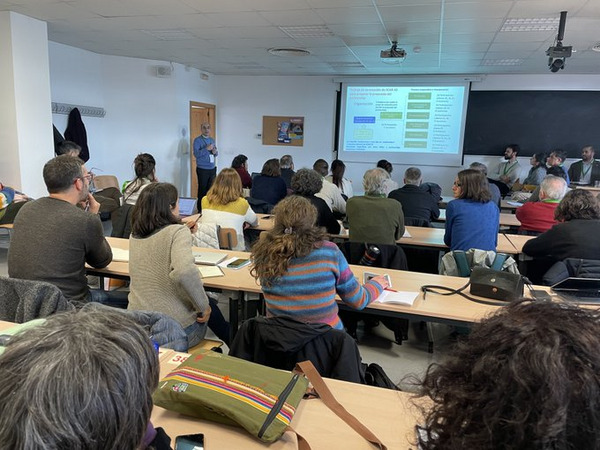Between the 19 and 21 of January, the University Pablo de Olavide invited to the IX International Congress on Agroecology. The congress was organized by the University Agro-ecosystems History Laboratory together with the ThinkTank Alimentta. It acted as a strong platform to promote agroecology research and agroecology movements in Europe and Latin America. Participants came from different fields, such as practice, research, policy-making, showing the strength of the agroecology movement as well as highlighting the key needs in terms of scientific research. The three-day Congress had a main focus on the development of Agroecologically based local Food Systems (SALBAs for the Spanish acronym) as the strategy for scaling up existing best practices and boosting the Agroecology transition.
Some of the key contributions of the Congress were done by key figures of Agroecology, such as Clara Nicholls or Michel Pimbert. In addition, there was a focus on the connection between healthy and sustainable diets during a panel organized by nutritionists and doctors lead by Nicolas Olea who facilitated an interesting multi-disciplinary dialogue between Agroecology and Nutrition, expressing the systemic relevance of dietary changes for human as well as environmental health.
ALL-Ready, together with the SCAR Working Group on Agroecology, AE4EU, and the regional government of Andalusia organized a panel discussion to present the development of the European Partnership of Agroecology Living Labs and Research Infrastructures to the Spanish speaking Agroecology community, with the goal to raise awareness about the partnership among existing agroecology initiatives in the Country. With almost 100 attendees the panel was a great success addressing many questions of the potential participants of the future activities of the partnership.
The panel was facilitated by Miguel de Porras (FiBL Europe) and the speakers were, Bejamin Sanchez from the Spanish AEI and lead member of the SCAR Working Group on Agroecology, José Manuel Avila, Agroecology Coordinator of Lifewatch ERIC, Rosa Mosquera, Full Professor at USC and member of AE4EU as well as Jon Jauregui, chief of Organic Production Systems at the Regional Government of Andalusia. The panel explained the framework of the partnership, introduced the vision of Agroecology Living Labs and Research Infrastructures as well as the activities of ALL-Ready and AE4EU. This was followed by an intense exchange with the audience that was extremely interested, seeing the partnership as a relevant tool for the agroecology transition and discussing potential ways of engaging.
The panel was extremely successful not only due to the high participation and the fruitful interaction with the participants. The panelists also provided diverse views on the partnership, from the European to the Regional level, already showing the multi-level nature of the partnership and the strong need for coordinating and cooperating between stakeholders at all geographical levels. Organizing the panel in Spanish was key to integrate the participants addressed and to allow for the participation of grassroots initiatives in these discussions.
It was concluded that the Partnership represents a key tool for the agroecology transition in the EU. Yet, existing agroecology initiatives need to be better informed and integrated in order to ensure support to the Agroecology movement with this European Instrument.

 tap and then scroll down to the Add to Home Screen command.
tap and then scroll down to the Add to Home Screen command.